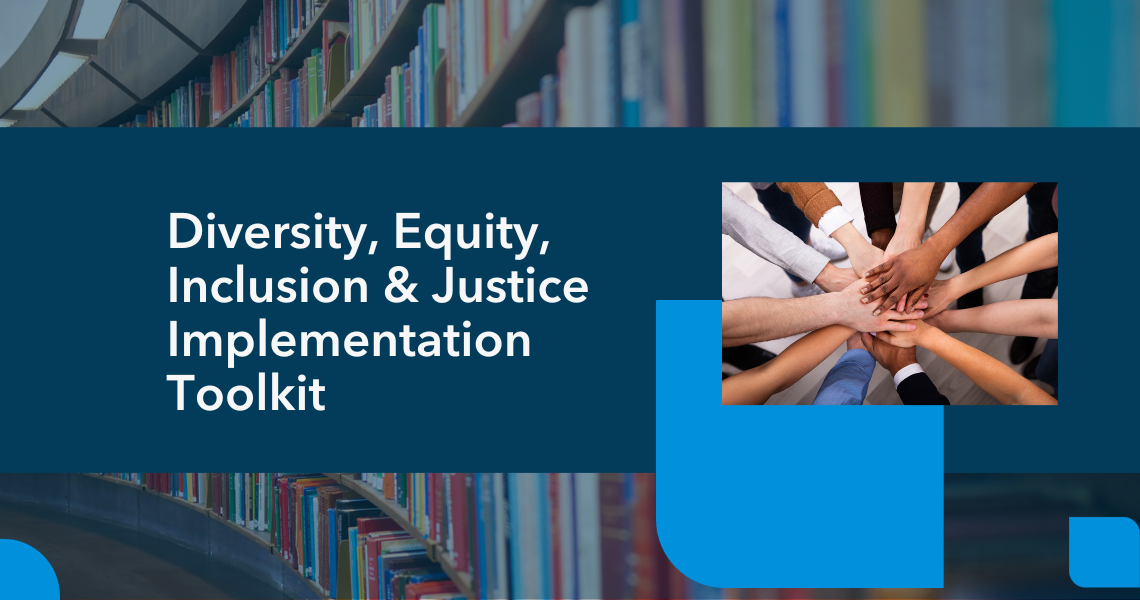The George Washington University (GW) Cancer Center's Diversity, Equity, Inclusion, and Justice (DEIJ) Implementation Toolkit was designed to help multidisciplinary cancer care teams identify key organizational priorities for DEIJ and initiate organizational change.
This toolkit is based on a pilot training series in which the GW Cancer Center, The Medstar Health Research Institute and Washington Cancer Institute, and Howard University Cancer Center collaborated in assembling three task forces comprised of clinicians, community health workers, clinical research coordinators, nurse managers, and physicians from multiple cancer care institutions located in Washington, DC to support their DEIJ efforts.
Each session outlines its learning objectives and priorities, and provides learning materials including worksheets, slide decks, and presentation recordings.
- Pre-Learning:
-
Learning Objectives:
- Describe what is implicit bias and how it can affect patient health outcomes.
- Assess personal baseline prior to implementing organizational change.
- Assess your organization’s current DEIJ policies, practices, and atmosphere.
Learning Materials:
Take the Course: Implicit Bias: A Practical Guide for Healthcare Settings
Foundations & Frameworks:
- Session 1: Introduction to DEIJ Implementation
-
Learning Objectives:
- Define key terminology related to diversity, equity, inclusion and justice (DEIJ) principles, including assessment metrics
- Recognize opportunities for organizational improvement using DC Health Equity framework.
- Assess organizational culture for racial equity through standardized measurements.
- Describe and identify DEIJ organizational assessment metrics.
Learning Materials:
Take the Course: Together, Equitable, Accessible, Meaningful (TEAM) Training
Session 1: Organizational Assessment Worksheet (PDF)
Session 1: Introduction to DEIJ Implementation Slides (PDF)
Session 1: Introduction to DEIJ Implementation
Learning Resources:
Joint Commission: Certification Program
- Session 2: Yolanda Lewis-Ragland, Culturally-Appropriate Care
-
Learning Objectives:
- Define key terminology related to cultural humility, cultural responsiveness and cultural appropriate care.
- Describe culturally-appropriate care for patients whose native language is not English.
- Describe organizational culture that prioritizes the social needs of historically marginalized patient populations.
- Assess organizational culture for cultural appropriateness through standardized measurements.
Learning Materials:
Session 2: Organizational Assessment Worksheet (PDF)
Session 2: Culturally-Appropriate Care Slides (PDF)
Session 2: Culturally-Appropriate Care
Learning Resources:
- Session 3: Christopher King, Healthy, Equitable Communities & Community Engagement
-
Learning Objectives:
- Describe social determinants of health and how they affect cancer outcomes.
- Explain key components of healthy and equitable communities.
- Explain what reciprocal community partnerships look like.
- Describe community engagement, continuous improvement and accountability.
- Assess organization’s community engagement culture through standardized measurements.
Learning Materials:
Session 3: Organizational Assessment Worksheet (PDF)
Session 3: Healthy Equitable Communities and Community Engagement Slides (PDF)
Session 3: Healthy Equitable Communities and Community Engagement
Learning Resources:
Dr King's Race, Place and Structural Racism: A Review of Health and History in Washington, DC
- Session 4: LaQuandra Nesbitt, Communicating Equity to Stakeholders & Inclusive Governance
-
Learning Objectives:
- Identify strategies for disseminating institutional values to key partners.
- Assess organizational capacity and infrastructure to communicate DEIJ values/ commitments.
- Describe inclusive and equitable governance.
- Assess organizational culture for inclusive and equitable governance.
- Assess organizational inclusivity through standardized measurements.
Learning Materials:
Session 4: Organizational Assessment Worksheet (PDF)
Session 4: Communicating Equity to Stakeholders & Inclusive Governance Slides (PDF)
Session 4: Communicating Equity to Stakeholders & Inclusive Governance
- Session 5 & 6: Action Planning & Implementation
-
Learning Objectives:
- Identify areas for organizational improvement based on organizational assessment (exercises from past sessions).
- Identify action planning principles for health and equitable communities.
- Present action plan to address priority areas for health equity advancements.
Learning Materials:
Write your SMARTIE Goals (Word Doc)
Learning Resources:
By this point, your action plan should be created based on the organizational priorities you have identified in preceding sessions. The following sessions are intended to support action plans, generate opportunities for further consideration, and continue to develop institutional change from a variety of levels, including within your own teams and institutional backdrops.
- Session 7: Tess DeVos & Emily Thatcher, Utilizing Staff and Community Perspectives to Improve Social Needs Screening & Resource Connection
- Session 8: Priscilla Wang, Making the Business Case for DEIJ
- Session 9: Morgan Black, Optimizing Race, Ethnicity, & Language (REaL) and SOGI Data Collection
- Session 11: Devyn Woodfield, Developing Data Driven Dashboards for Change
- Session 12: Andres Gonzalez, Lessons Learned in Standing Up JEDI Strategy
- Session 13: Aswita Tan-McGrory, Applying an Equity Framework to Patient Safety Events and Root Cause Analysis
For additional information, fact sheets, and continuing learning, please refer to below:
- Resources for Continuing Learning:
-
10 Key Components of Healthy Equitable Communities
Building Cultural Competence (PDF)
Listen: Podcast, Joel Weissman on Hospitals Addressing Racism
Raising the Bar: Framework for Promoting Equity and Excellence in Healthcare
Strategies for Equitable Community Engagement (PDF)
The Case for the Enhanced National CLAS Standards (PDF)
- Resources for Organizations:
-
I Want You to Know Posters (in English, Spanish and Chinese)
This work was supported by cooperative agreement U01DP006639 from the Centers for Disease Control and Prevention (CDC). The work does not necessarily reflect the views of the CDC.
